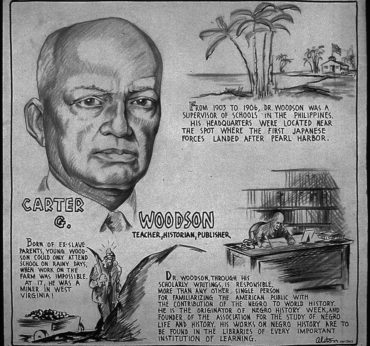
Carter G. Woodson established Negro History Week in 1926 and chose to celebrate it the second week of February because it marks the birthdays of Frederick Douglass and Abraham Lincoln, two men who left an indelible mark on African-American history.
In addition to Douglass and Lincoln, W.E.B. DuBois, Langston Hughes, and Eubie Blake were also born in February and the founding of the NAACP and the first Pan African Congress took place during that month. Hiram Revels, the first African-American Senator took the oath of office in February 1870.
The following essay, written by Dr. Herbert Aptheker, appeared in The Daily Worker on April 11, 1950, two days after Dr. Woodson’s death:
He was a tall, slim, straight man. He conveyed the impression of great strength, of solidarity and calm. A genial person, modest, never ingratiating, always to the point, with a sharp sense of humor and a quick, warm laugh.
He was a prodigious worker, a remarkable organizer and an extraordinary scholar; and he was a Negro with a consuming love for his people and pride in them and contempt for the “barbarians” – as he used to refer to the chauvinists – who oppressed the Negro.
We write of Dr. Carter Godwin Woodson, who died April 8, 1950; and so full was he of life that one’s pen rebels at applying the past tense to him.
In the deepest sense, the past tense does not apply to Dr. Woodson, for his work has the most profound import for the present, and his work will live so long as truth and courage are admired in the world.
He was born in Virginia in 1875, of parents who had been slaves. Through the efforts of these one-time slaves, and through his own very hard work – including coal-mining in West Virginia – enough was saved so that young Woodson might study. He attended Berea College in Kentucky, obtained his bachelor’s and master’s degrees at the University of Chicago (always working evenings and summers), studied at the Sorbonne in Paris, and received his doctor’s degree from Harvard in 1912.
Following several years of experience as a teacher of French, Spanish and history in the public schools of West Virginia and the District of Columbia, Dr. Woodson was appointed Dean of the School of Liberal Arts at Howard University in 1919.

He remained there only one year, however, and important in his leaving was the snooping of a Red-baiting Congressman who expressed great displeasure over the fact that Dr. Woodson’s school insisted on discussing and reading about the Bolshevik Revolution.
There followed a two-year period as Dean of the West Virginia Collegiate Institute, after which Dr. Woodson gave up his academic career to devote himself entirely to the enterprise that he had already begun and to which he devoted the remainder of his life.
Late in 1915, Dr. Woodson and five friends founded the Association for the Study of Negro Life and History, with Dr. Woodson as the Director. In January 1916, the first number of the Journal of Negro History appeared, a quarterly that flourishes today and which Dr. Woodson edited from its first appearance until his death.
The Association and the Journal have been the backbone of the renaissance in Negro history which in turn has been so vital a part of the modern Negro liberation movement. Attempts by wealthy individuals and so-called benevolent foundations to gain control of the Association or to swerve it from its course of dedication to scientific inquiry were steadfastly resisted by Dr. Woodson.
While editing the Journal, directing the Association, conducting the efforts of the Association Publishers, founding (in 1925) and developing the nationwide celebration of Negro History Week, Dr. Woodson found time to launch, in 1937, the excellent monthly Negro History Bulletin, and to compile in four volumes, The Works of Francis J. Grimke (1942). Meanwhile, beginning in 1917 with The Education of the Negro Prior to 1861, he produced a total of seventeen major works in the field of Negro history, including The African Background, The Negro in Our History, the Rural Negro, and A Century of Negro Migration.
Toward the close of his life, Dr. Woodson became more and more sharply critical of American imperialism and, in November 1949, he denounced the Truman administration for supporting world colonialism. Referring to the struggling masses and to the efforts of the imperialists to defeat them, he declared:
“While there may be more guns to kill off the patriots, they will hardly become frightened for they have learned from Thomas Jefferson that the soil of liberty must be moistened with the blood of patriots and tyrants.”
When, in 1926, the National Association for the Advancement of Colored People awarded the Spingarn Medal to Dr. Woodson as the outstanding Negro of the year, it stated the action was taken in recognition of Dr. Woodson’s “labors for the truth.” Let that be his epitaph; in the death of Dr. Carter G. Woodson the world has lost one of its most ardent and most fruitful “laborers for the truth.” As such, he is assured immortality.










